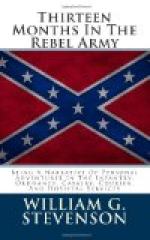In the battle of Pittsburg Landing he was taken prisoner by the very regiment to which he had formerly belonged. This sealed his fate. On the way to Corinth several of his old comrades, among them his two brothers, attempted to kill him, one of them nearly running him through with a bayonet. He was, however, rescued from this peril by the guard. Three days after the retreating army had reached Corinth, General Hardee, in whose division was the regiment claiming this man as a deserter, gave orders to have Rowland executed. The general, I hope from some misgivings of conscience, was unwilling to witness the execution of his own order, and detailed General Claibourne to carry out the sentence. About four o’clock P.M., some 10,000 Tennessee troops were drawn up in two parallel lines, facing inward, three hundred yards apart. The doomed man, surrounded by the guard, detailed from his own former regiment to shoot him, marched with a firm step into the middle of the space between the two lines of troops. Here his grave had been already dug, and a black pine coffin lay beside it. No minister of religion offered to direct his thoughts to a gracious Saviour. I fear he was poorly prepared for the eternity upon which he was just entering.
The sentence was read, and he was asked if he had any thing to say why it should not be executed. He spoke in a firm, decided tone, in a voice which could be heard by many hundreds, and nearly in the following words. “Fellow-soldiers, Tennesseans, I was forced into Southern service against my will and against my conscience. I told them I would desert the first chance I found, and I did it. I was always a Union man and never denied it, and I joined the Union army to do all the damage I could to the Confederates. I believe the Union cause is right and will triumph. You can kill me but once, and I am not afraid to die in a good cause. My only request is, that you let my wife and family know that I died like a man in supporting my principles. My brothers there would shoot me if they had a chance, but I forgive them. Now shoot me through the heart, that I may die instantly.”
Such were his fearless, even defiant words, and I recall them with the distinctness of a present thought, for it needed little imagination to place myself in his stead. Had I succeeded in escaping at any former period and been retaken, this would have been my fate. While I saw the hazard, I was none the less resolved to make the attempt, and soon.
After Rowland had ceased to speak, he took off hat, coat, and necktie, and laying his hand on his heart, he said, “Aim here.” But the sergeant of the guard advanced to tie his hands and blindfold him. He asked the privilege of standing untied; the request was not granted. His eyes were then bandaged, he kneeled upon his coffin, and engaged in prayer for several minutes, and then said he was ready. The lieutenant of the guard then gave the word, “Fire,” and twenty-four muskets,




